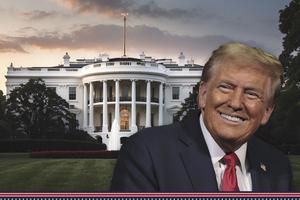The Trump Administration: More Catholic Than You Know
COMMENTARY: From what I’ve seen, the president’s team is earnestly striving to apply the precepts of our faith to the policies that govern America.

Editor's note: This story was updated March 7.
Thirteen. That’s how many presidents have served this country in my lifetime. I remember almost all of them — all but Dwight Eisenhower, who occupied the Oval Office when I was born.
From a young age, I was interested in how each president approached faith. Did they practice what they preached? Did their policies broadly reflect Christian teaching? These are the questions I’ve asked myself.
Now I have a surprising answer. Donald Trump’s administration is the most Christian I’ve ever seen.
Please, don’t misunderstand me. I’m not denigrating the faith of any of his predecessors, many of whom were famous for their Christianity. I think, for instance, of Jimmy Carter calling himself a “born-again Christian,” and George W. Bush pursuing “compassionate conservatism” out of his Christian convictions.
Nor am I saying that Donald Trump is a model of Christian charity. While the assassination attempt against his life last year seemed to make him more aware of God, I have no way of gauging the nature or depth of his faith.
What I am saying is that Donald Trump has surrounded himself with a large number of strong Christian — especially strong Catholic — people. His vice president, JD Vance, may very well be the most articulate Catholic politician in the modern world. His cabinet is more than one-third Catholic, and more importantly, there are serious Catholics who follow what the Church teaches and earnestly try to understand the faith and apply it to governing. I think of Sean Duffy, who has nine kids, and Marco Rubio, who has spoken at length about how Catholic social teaching shapes his approach to policy.
Then there’s the president’s senior staff, who are mostly outside the limelight. I’ve had the privilege to meet and work with many of them over the years, and suffice it to say, a large number are Catholics and Christians who take their faith seriously. Some staff members are returning from the first Trump administration, when a Catholic priest in Washington, D.C., celebrated Mass for many of them in the White House itself back then. Others are new, bringing a burst of fresh energy and ideas to Trump’s second term.
Crucially, from what I’ve seen, the president’s team is earnestly striving to apply the precepts of our faith to the policies that govern America, while faithfully advancing his goals. While naysayers claim that they’re “Christian nationalists” who effectively want to convert Americans at the point of a sword, the truth is that they’re starting from Christian principles that apply to all people at all times.
This administration is protecting unborn life to a significant extent. It’s also advancing the reality of a person’s biological sex through a wide variety of policy decisions. It’s restoring subsidiarity, which holds that problems should be solved as locally as possible, by dialing back decades of federal control over states and the economy. It’s protecting American sovereignty, which Pope St. John Paul II rightly said is “fundamental” to society. And yes, the Trump administration is unabashedly patriotic, which St. John Paul II told us is also natural and necessary.
On foreign policy, the Trump administration is an unabashed advocate for international religious liberty. Look no further than JD Vance’s speech in Munich, in which he excoriated the U.K. for punishing a man who prayed outside an abortion facility.
While many Catholics have concerns about the President’s approach to countries like Ukraine, it’s hard to say what does and doesn’t align with Catholic teaching. Foreign policy tends to have more tough decisions and murky gray areas, making it harder to discern the Christian approach and take prudent action to advance it. That said, peace is absolutely a Christian goal, as Pope Francis and his predecessors have said many times. If nothing else, President Trump deserves praise for pursuing peace.
Is the Trump administration perfectly aligned with Catholic teaching? Hardly. The president’s support for IVF is a huge moral problem. His rhetoric toward immigrants shows a lack of charity, though his immigration policies so far have aligned with the Church’s longstanding understanding of national sovereignty and the duties owed to citizens. The administration is also in its early days, so future policies could majorly depart from the trajectory. A lot could happen in the next four years.
No doubt, there are many who think that Trump’s policies are un-Christian in the extreme. But I believe that says more about them and the corrupting nature of modern society and ideology. In the broader culture — and even in parts of the Catholic Church — faith has become synonymous with an all-powerful government that tries to do everything but does nothing well.
Christianity doesn’t mean trapping people on welfare, nor does it mean destroying a nation’s borders. In reality, Christianity requires difficult and prudential decisions about how best to promote the common good and protect the human person.
Tim Busch is founder of the Napa Institute, a Catholic organization.
- Keywords:
- donald trump
- catholic politicians
- christian prayer

















